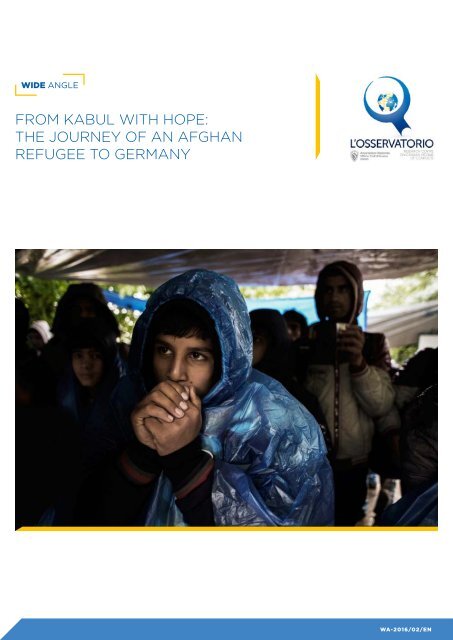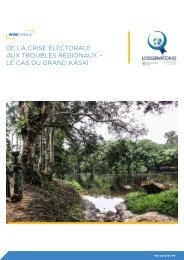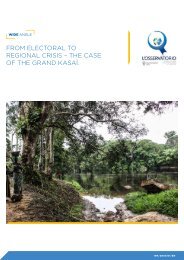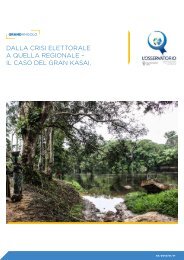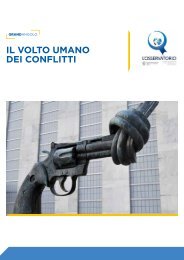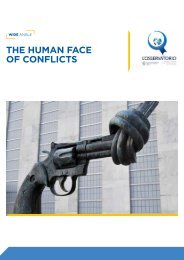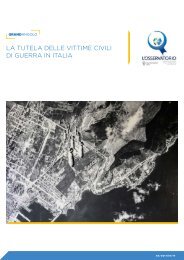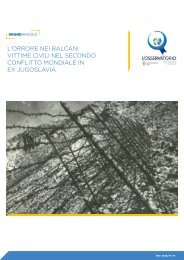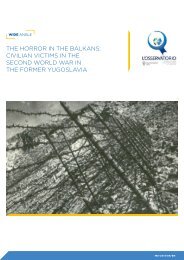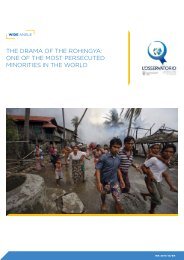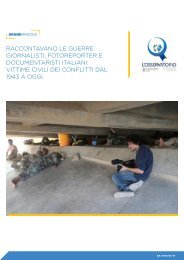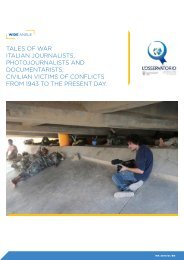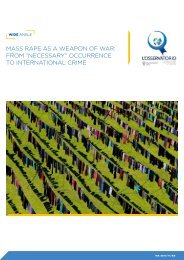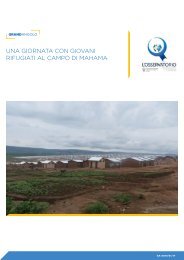From Kabul with Hope - The journey of an Afghan refugee to Germany
You also want an ePaper? Increase the reach of your titles
YUMPU automatically turns print PDFs into web optimized ePapers that Google loves.
FROM KABUL WITH HOPE:<br />
THE JOURNEY OF AN AFGHAN<br />
REFUGEE TO GERMANY<br />
WA-2016/02/EN
Authors: James Weir (Independent Researcher) <strong>an</strong>d Rohullah Amin (Direc<strong>to</strong>r / Senior<br />
Research Fellow – Americ<strong>an</strong> Institute <strong>of</strong> Afgh<strong>an</strong>ist<strong>an</strong> Studies – <strong>Kabul</strong>)<br />
Editing: Sally Deffor (UN online volunteer)<br />
Pho<strong>to</strong> Edi<strong>to</strong>r: Cyril Groué (UN online volunteer)<br />
Graphic design: Vilmar Luiz <strong>an</strong>d D<strong>an</strong>ilo Coelho Nogueira (UN online volunteers)<br />
Copyright © 2016<br />
L’Osserva<strong>to</strong>rio – Research centre on civili<strong>an</strong> victims <strong>of</strong> conflicts<br />
Via Marche, 54<br />
00187 Rome – Italy<br />
For further information <strong>an</strong>d feedback, please contact:<br />
@Osserva<strong>to</strong>rioOrg<br />
losserva<strong>to</strong>rio.org<br />
info@losserva<strong>to</strong>rio.org<br />
This research paper is <strong>an</strong> independent publication commissioned by L’Osserva<strong>to</strong>rio.<br />
<strong>The</strong> <strong>an</strong>alysis, conclusions <strong>an</strong>d recommendations expressed in this document do not<br />
necessarily reflect the <strong>of</strong>ficial position <strong>of</strong> L’Osserva<strong>to</strong>rio. Textual material may be freely<br />
reproduced <strong>with</strong> proper citation <strong>an</strong>d/or attribution <strong>to</strong> the author <strong>an</strong>d edi<strong>to</strong>r.<br />
Names have been ch<strong>an</strong>ged <strong>to</strong> preserve <strong>an</strong>onymity <strong>of</strong> Akbar <strong>an</strong>d his family. Multiple<br />
Skype interviews conducted <strong>with</strong> Akbar between February <strong>an</strong>d May, 2016 while he was<br />
in a <strong>refugee</strong> hostel in Germ<strong>an</strong>y inform this article. Each family member was interviewed<br />
in-person in <strong>Kabul</strong> in late December, 2015. Interviews conducted <strong>with</strong> Akbar’s parents<br />
by James Weir in <strong>Kabul</strong> in 2005 provide life his<strong>to</strong>rical background. Interviews were recorded<br />
<strong>an</strong>d tr<strong>an</strong>slated from Dari in<strong>to</strong> English.<br />
2
<strong>The</strong> decision <strong>to</strong> leave Afgh<strong>an</strong>ist<strong>an</strong> on foot, <strong>an</strong>d cross Ir<strong>an</strong> <strong>an</strong>d Turkey in<strong>to</strong> Europe –<br />
<strong>with</strong> 250 US dollars (USD), a knapsack, <strong>an</strong>d a dream <strong>of</strong> better future – warr<strong>an</strong>ts close<br />
ethnographic scrutiny. Over a million people, nearly a quarter <strong>of</strong> whom are Afgh<strong>an</strong>,<br />
left their homel<strong>an</strong>ds seeking asylum on Europe<strong>an</strong> soil in 2015 alone. 1 Among these<br />
is Akbar, a young Afgh<strong>an</strong> m<strong>an</strong> who left <strong>Kabul</strong> in early June 2015 <strong>an</strong>d, three months,<br />
7,000 km <strong>an</strong>d 7,000 USD later, arrived in Fr<strong>an</strong>kfurt, Germ<strong>an</strong>y. In early May 2016, he<br />
<strong>an</strong>xiously awaits news <strong>of</strong> his asylum application in a <strong>refugee</strong> hostel. This article traces<br />
his family’s his<strong>to</strong>ry as <strong>refugee</strong>s beginning <strong>with</strong> the Soviet-Afgh<strong>an</strong> war nearly four<br />
decades ago, <strong>an</strong>d details the costs <strong>an</strong>d the abuses Akbar experienced enroute <strong>to</strong><br />
Europe. We conclude: first, four decades <strong>of</strong> conflict shape how Afgh<strong>an</strong>s evaluate current<br />
circumst<strong>an</strong>ces <strong>an</strong>d possible futures; <strong>an</strong>d second, after the devastating <strong>to</strong>ll – emotional,<br />
physical <strong>an</strong>d fin<strong>an</strong>cial – <strong>of</strong> the <strong>journey</strong> itself, the forced repatriation <strong>of</strong> asylum<br />
seekers would add yet one more vulnerable group in<strong>to</strong> the country’s instability.<br />
Keywords: Afgh<strong>an</strong>ist<strong>an</strong>; Asylum; Europe<strong>an</strong> Refugee Crisis; Conflict; Hum<strong>an</strong> Smuggling;<br />
Migration.<br />
3
Table <strong>of</strong> Contents<br />
First Encounters: “<strong>The</strong> Str<strong>an</strong>ge Extravag<strong>an</strong>ce <strong>of</strong> Foreigners”..........................................5<br />
Family His<strong>to</strong>ry: “We Stayed in the Mountains”..................................................................... 5<br />
Preparations: “<strong>The</strong> Game is On”.............................................................................................. 6<br />
<strong>The</strong> Journey: “I Was Ready <strong>to</strong> Die”......................................................................................... 7<br />
<strong>Kabul</strong> <strong>to</strong> Ir<strong>an</strong>i<strong>an</strong> Border (3 days – 250 USD)........................................................................... 7<br />
Ir<strong>an</strong> (20 days – 1,500 USD)............................................................................................................. 8<br />
Turkey (25 days – 700 + 2,500 USD)......................................................................................... 8<br />
Bulgaria (30 days – 370 USD) ...................................................................................................... 9<br />
Serbia (10 days – 700 USD)......................................................................................................... 10<br />
Hungary <strong>an</strong>d Austria <strong>to</strong> Germ<strong>an</strong>y (5 days – 750 USD)...................................................... 10<br />
Germ<strong>an</strong>y.............................................................................................................................................. 10<br />
Waiting: “If I Had Known”........................................................................................................ 10<br />
Conclusion: “I Will Not Stay”...................................................................................................12<br />
Endnotes...................................................................................................................................... 14<br />
4
First Encounters: “the Str<strong>an</strong>ge Extravag<strong>an</strong>ce <strong>of</strong> Foreigners”<br />
Akbar was nine when we met in 2004. His parents were live-in caretakers at <strong>an</strong><br />
Americ<strong>an</strong> NGO in <strong>Kabul</strong> where I <strong>of</strong>ten stayed while conducting fieldwork for a dissertation<br />
in cultural <strong>an</strong>thropology. M<strong>an</strong>y afternoons, I joined Akbar <strong>an</strong>d other local<br />
kids in soccer matches we org<strong>an</strong>ized at the NGO. He was the youngest boy, <strong>an</strong>d as I<br />
was the most senior player on the tiny pitch, we were <strong>of</strong>ten paired.<br />
In November 2015, I returned <strong>to</strong> the NGO compound. Akbar’s father, Ghahrem<strong>an</strong><br />
(a nickname which me<strong>an</strong>s champion), graciously greeted me at the door, <strong>an</strong>d after<br />
friendly inquiries over pastries <strong>an</strong>d green tea, asked if I w<strong>an</strong>ted <strong>to</strong> arm wrestle. A decade<br />
older <strong>an</strong>d half a foot shorter, he won h<strong>an</strong>dily. He soon informed me that Akbar<br />
had made his way from <strong>Kabul</strong> <strong>to</strong> Fr<strong>an</strong>kfurt.<br />
My memory <strong>of</strong> Akbar is <strong>of</strong> a h<strong>an</strong>dsome, brooding boy; intense, respectful, <strong>with</strong> a<br />
dist<strong>an</strong>t look in his eyes. 2 Even at a young age, he appeared more perplexed th<strong>an</strong> his<br />
peers by the str<strong>an</strong>ge extravag<strong>an</strong>ce <strong>of</strong> foreigners passing through the compound.<br />
Akbar was born a third generation <strong>refugee</strong>, the middle child <strong>of</strong> five siblings born in<br />
Pakist<strong>an</strong> <strong>an</strong>d Ir<strong>an</strong>. During the summer <strong>of</strong> 2015, almost 20 years old, Akbar left again<br />
<strong>to</strong> begin a life far from <strong>Kabul</strong>’s insecurity.<br />
After a few days <strong>of</strong> discussions <strong>with</strong> his family, I asked if I could interview them<br />
about Akbar’s <strong>journey</strong> <strong>an</strong>d their involvement <strong>with</strong> it. Ten years earlier, I had conducted<br />
life his<strong>to</strong>ry interviews <strong>with</strong> his parents, <strong>an</strong>d these provide family context <strong>to</strong><br />
Akbar’s experience. Together <strong>with</strong> a mutual family friend, Rohullah Amin, (a clinical<br />
psychologist <strong>an</strong>d direc<strong>to</strong>r <strong>of</strong> <strong>an</strong> Afgh<strong>an</strong> research institute), we conducted interviews<br />
<strong>with</strong> Akbar <strong>an</strong>d the family that we have arr<strong>an</strong>ged in<strong>to</strong> this account.<br />
Family His<strong>to</strong>ry: “We Stayed in the Mountains”<br />
<strong>The</strong> following section draws upon interviews conducted in <strong>Kabul</strong> <strong>with</strong> Akbar’s parents<br />
in 2005.<br />
Ghahrem<strong>an</strong> (Akbar’s father) is from Ghazni: a millennia ago, the capital <strong>of</strong> the vast<br />
Ghaznavid Empire 3 that stretched from North India <strong>to</strong> Ir<strong>an</strong> <strong>an</strong>d Central Asia. Today,<br />
this city <strong>of</strong> 150,000 residents, located a d<strong>an</strong>gerous three-hour drive south <strong>of</strong> <strong>Kabul</strong>, is<br />
infiltrated by insurgents. As a young m<strong>an</strong>, Akbar’s father was conscripted by the local<br />
Mujahideen 4 <strong>to</strong> fight against the Soviet <strong>an</strong>d Afgh<strong>an</strong> communists. But as <strong>an</strong> untrained<br />
foot soldier thrust on<strong>to</strong> the frontlines <strong>of</strong> a popular uprising, he found his Mujahideen<br />
comm<strong>an</strong>ders <strong>to</strong> be abusive <strong>an</strong>d corrupt.<br />
“We stayed in the mountains,” he complains, “hungry <strong>an</strong>d thirsty, feet bleeding, sleeping<br />
on the rocks <strong>an</strong>d in caves. Sometimes the villagers fed us, while our leaders grew fat <strong>an</strong>d<br />
wealthy sitting comfortably in Pakist<strong>an</strong> <strong>an</strong>d Gulf State.” 5 After four years he escaped<br />
both the Mujahideen <strong>an</strong>d the Soviet-sponsored Afgh<strong>an</strong> government for refuge in Ir<strong>an</strong>,<br />
cementing a distrust in national politics shared by m<strong>an</strong>y Afgh<strong>an</strong>s <strong>of</strong> his generation, a distrust<br />
that only hardens as multiple regimes have risen <strong>an</strong>d fallen through violence since.<br />
5
Jamila (Akbar’s mother) is from a rural village in Paghm<strong>an</strong>, a mountainous farml<strong>an</strong>d on<br />
the outskirts <strong>of</strong> <strong>Kabul</strong>.Jamila (Akbar’s mother) is from a rural village in Paghm<strong>an</strong>, a mountainous<br />
farml<strong>an</strong>d on the outskirts <strong>of</strong> <strong>Kabul</strong>. Her father died in a car accident when she was<br />
young girl, shortly before Soviet forces entered Afgh<strong>an</strong>ist<strong>an</strong> (in 1979). Initially her family<br />
(at this time unacquainted <strong>with</strong> Ghahrem<strong>an</strong>) risked their lives as well in support <strong>of</strong> the<br />
resist<strong>an</strong>ce, secretly feeding fighters hiding in the mountains.<br />
Jamila says “Cooking for the Mujahideen me<strong>an</strong>t rewards in the afterlife”, adding that she<br />
was never sure what the Russi<strong>an</strong>s w<strong>an</strong>ted in Afgh<strong>an</strong>ist<strong>an</strong>. But as young Jamila <strong>an</strong>d her<br />
sisters matured, war <strong>an</strong>d lawlessness made them increasingly vulnerable <strong>to</strong> abuse from<br />
both the Mujahideen resist<strong>an</strong>ce <strong>an</strong>d government forces. Three years in<strong>to</strong> the war, Jamila’s<br />
mom decided they had <strong>to</strong> leave, <strong>an</strong>d after months <strong>of</strong> thwarted efforts, the family finally<br />
succeeded in crossing the border in<strong>to</strong> Pakist<strong>an</strong>. A year later, Jamila was introduced <strong>to</strong><br />
Ghahrem<strong>an</strong>, fourteen years her senior <strong>an</strong>d just days before <strong>an</strong> arr<strong>an</strong>ged marriage.<br />
Akbar <strong>an</strong>d all his siblings were born outside <strong>of</strong> Afgh<strong>an</strong>ist<strong>an</strong>: his two older brothers in Pakist<strong>an</strong>;<br />
he <strong>an</strong>d his two younger sisters in Ir<strong>an</strong>. After the Talib<strong>an</strong> fell from power in 2001, his<br />
family returned <strong>to</strong> <strong>Kabul</strong>, finding employment <strong>an</strong>d residence at <strong>an</strong> Americ<strong>an</strong> NGO where<br />
Ghahrem<strong>an</strong> still works. Akbar was eight when he first set foot on Afgh<strong>an</strong> soil. Twelve<br />
years later, <strong>with</strong> the bulk <strong>of</strong> US <strong>an</strong>d NATO forces recently <strong>with</strong>drawn <strong>an</strong>d the Talib<strong>an</strong> <strong>an</strong>d<br />
Islamic State (IS) exp<strong>an</strong>ding, Akbar prepares <strong>to</strong> cross Ir<strong>an</strong> for prospects beyond.<br />
Preparations: “<strong>The</strong> Game is On”<br />
<strong>The</strong> following section draws upon family interviews conducted in <strong>Kabul</strong> in late 2015.<br />
After weeks <strong>of</strong> delay, at 11 pm on a hot summer night in the first week <strong>of</strong> June, the smuggler<br />
called, “the game is on” he said. Akbar had <strong>an</strong> hour <strong>to</strong> get <strong>to</strong> the bus station. With<br />
250 USD hidden in the folds <strong>of</strong> his Shalwar Kameez 6 <strong>an</strong>d a knapsack containing <strong>an</strong> old<br />
Samsung phone; two pairs <strong>of</strong> clothes; dried fruit; hard-boiled eggs; na<strong>an</strong>; <strong>an</strong>d a sewing<br />
needle – his mother taught him <strong>to</strong> sew in preparation – Akbar set <strong>of</strong>f <strong>to</strong> begin a life far<br />
from Afgh<strong>an</strong>ist<strong>an</strong>, unsure <strong>of</strong> his destination.<br />
After a rushed, emotional goodbye, Omar, Akbar’s middle brother, <strong>to</strong>ok the younger<br />
Akbar <strong>to</strong> the bus station. <strong>The</strong> eldest boy, Mahmood, <strong>an</strong>d Akbar’s dad were both away at<br />
work when the call came, <strong>an</strong>d unable <strong>to</strong> say goodbye in person. Akbar <strong>an</strong>d Omar waited<br />
in<strong>to</strong> early morning for the bus <strong>to</strong> board <strong>to</strong> Nimroz, a remote desert province no<strong>to</strong>rious for<br />
smuggling <strong>an</strong>d b<strong>an</strong>ditry on the Ir<strong>an</strong>i<strong>an</strong> <strong>an</strong>d Pakist<strong>an</strong>i border.<br />
One <strong>of</strong> the local me<strong>an</strong>s <strong>of</strong><br />
tr<strong>an</strong>sportation used by migr<strong>an</strong>ts <strong>an</strong>d<br />
<strong>refugee</strong>s in Afgh<strong>an</strong>ist<strong>an</strong><br />
Credit: James Weir<br />
6
Omar recounts the departure at the bus station, “I hugged Akbar a few times, <strong>an</strong>d I <strong>to</strong>ld him<br />
not <strong>to</strong> forget us. It is painful <strong>to</strong> watch your brother leave. I cried 100%. He sat in the bus. I<br />
said goodbye two or three times, waiting for the bus <strong>to</strong> leave. This moment was very painful.<br />
If he goes <strong>to</strong> Turkey, <strong>an</strong>d then somewhere else, when his life becomes better, he might<br />
forget us. My mom kept calling. We were afraid he would die, or be put in prison, he’d be<br />
lonely. He was very young, <strong>an</strong>d never traveled, we did not believe he would arrive.”<br />
A few weeks earlier Akbar <strong>an</strong>d his father met the smuggler, Aziz, in Paghm<strong>an</strong> <strong>to</strong> discuss<br />
the trip. Aziz’s family is well known for taking people <strong>to</strong> Turkey <strong>an</strong>d Europe. A third party,<br />
<strong>an</strong> “agent”, was given 1,500 USD at a money exch<strong>an</strong>ge shop in <strong>Kabul</strong>. When the agent<br />
received a call from Akbar about his safe arrival in Turkey, the agent would release the<br />
money <strong>to</strong> Aziz’s associate in <strong>Kabul</strong> – at least that was the pl<strong>an</strong>.<br />
Akbar’s father, Ghahrem<strong>an</strong>, earns 250 USD a month working as a live-in guard <strong>an</strong>d caretaker<br />
at <strong>an</strong> Americ<strong>an</strong> NGO, a job he has had since the family returned from Ir<strong>an</strong> over<br />
a decade ago. <strong>The</strong> entire family had lived at the institute’s compound, where Akbar’s<br />
mother cooked <strong>an</strong>d cle<strong>an</strong>ed, until pressure from two uncles forced her <strong>to</strong> leave the job.<br />
<strong>The</strong>se two uncles have threatened the family for years, calling them “kafirs” (infidels)<br />
<strong>an</strong>d “slaves <strong>of</strong> Americ<strong>an</strong>s”, accusing Jamila <strong>of</strong> being a prostitute because she worked<br />
openly <strong>with</strong> Americ<strong>an</strong>s. <strong>The</strong>se confrontations grew as Akbar became a young m<strong>an</strong>. Finally,<br />
a particularly heated altercation between Akbar <strong>an</strong>d these two former Mujahideen<br />
– described as drug addicts <strong>with</strong> Talib<strong>an</strong> mentalities – convinced the family <strong>to</strong> support<br />
Akbar’s asylum efforts. Jamila explains, “the Talib<strong>an</strong> is threatening because we work for<br />
Americ<strong>an</strong>s, the boys c<strong>an</strong> be killed if they join government, but these two uncles are even<br />
more d<strong>an</strong>gerous.”<br />
Between the smuggler’s fee <strong>an</strong>d travel money, the family committed 1,750 USD – seven<br />
months <strong>of</strong> Ghahrem<strong>an</strong>’s income – <strong>to</strong> Akbar’s <strong>journey</strong>. By the time he reaches Germ<strong>an</strong>y,<br />
the cost will be four times higher, 7,000 USD (over two years <strong>of</strong> income), gambled on the<br />
hope that one day perhaps one son will live in safety, <strong>an</strong>d even help the family.<br />
<strong>The</strong> Journey: “I Was Ready <strong>to</strong> Die”<br />
<strong>The</strong> first person account that follows is a paraphrased version <strong>of</strong> the <strong>journey</strong> <strong>to</strong>ld<br />
from Akbar’s perspective, based upon a series <strong>of</strong> Skype interviews conducted in<br />
early 2016, while Akbar was in a Germ<strong>an</strong> <strong>refugee</strong> hostel. This account has been reviewed<br />
<strong>with</strong> Akbar.<br />
<strong>Kabul</strong> <strong>to</strong> Ir<strong>an</strong>i<strong>an</strong> Border (3 days – 250 USD)<br />
I thought travel across southern Afgh<strong>an</strong>ist<strong>an</strong> would be the most d<strong>an</strong>gerous, but I was<br />
wrong. <strong>The</strong> Talib<strong>an</strong> s<strong>to</strong>pped <strong>an</strong>d searched the bus multiple times between <strong>Kabul</strong> <strong>an</strong>d<br />
Nimroz. In Nimroz I had <strong>to</strong> find Aziz, the smuggler, who arr<strong>an</strong>ged things.<br />
On the first day, I met Ali. He is a little younger th<strong>an</strong> me, from Baghl<strong>an</strong>. He was scared.<br />
We talked <strong>an</strong>d beg<strong>an</strong> traveling <strong>to</strong>gether. We <strong>to</strong>ok care <strong>of</strong> each other all the way <strong>to</strong> the<br />
Bulgari<strong>an</strong> border. He is in Austria now; we stay in <strong>to</strong>uch.<br />
7
Aziz (the smuggler) <strong>to</strong>ld us about the route, put one guy in charge <strong>of</strong> us, <strong>an</strong>d then left.<br />
He coordinated everything by phone, <strong>an</strong>d we never saw him again.<br />
That first night we were walking in a d<strong>an</strong>gerous desert <strong>to</strong>wards Ir<strong>an</strong>. It was so hot. I called<br />
my brother Omar <strong>an</strong>d <strong>to</strong>ld the family <strong>to</strong> pray for me. <strong>The</strong> Ir<strong>an</strong>i<strong>an</strong> border police shoot<br />
people.<br />
Suddenly, Toyota pickup trucks drove out <strong>of</strong> the darkness <strong>to</strong>wards us. Dark people <strong>with</strong><br />
black hats <strong>an</strong>d guns captured us. <strong>The</strong>y <strong>to</strong>ld us <strong>to</strong> lie face down <strong>an</strong>d recite the Kor<strong>an</strong>. We<br />
waited, expecting them <strong>to</strong> shoot us. <strong>The</strong>y robbed us <strong>an</strong>d drove away.<br />
Ir<strong>an</strong> (20 days – 1,500 USD)<br />
Two days later we were in Ir<strong>an</strong>. Baluch 7 smugglers <strong>to</strong>ok over. <strong>The</strong>y beg<strong>an</strong> <strong>with</strong> these<br />
rules: “1) Obey us at all times; 2) Don’t speak; 3) Pay in adv<strong>an</strong>ce; 4) Stay <strong>with</strong> the group;<br />
5) Or die alone.”<br />
<strong>The</strong>y had three Toyota pickup trucks, each crammed <strong>with</strong> about 20 passengers in the<br />
back. <strong>The</strong>y drove really fast across the desert; we bounced around <strong>an</strong>d became so caked<br />
in dust we could not tell who was who. Our mouths were coated <strong>with</strong> dust. At s<strong>to</strong>ps, they<br />
didn’t let us cle<strong>an</strong>.<br />
One boy was vomiting, <strong>with</strong> bad diarrhea <strong>an</strong>d weak. When we <strong>to</strong>ld the smugglers, they<br />
said if he couldn’t travel he’d be left behind in the desert.<br />
Usually we traveled at night, from near midnight <strong>an</strong>d until just before dawn. During the<br />
day, we were hidden in basements, farmhouses, s<strong>to</strong>res, <strong>an</strong>d petrol stations. At each location<br />
new people <strong>to</strong>ok over. <strong>The</strong>y made us cle<strong>an</strong> <strong>to</strong>ilets <strong>an</strong>d carry stuff. We never had<br />
enough food or water. When I resisted, they beat me.<br />
About five days in<strong>to</strong> the trip, one guy complained <strong>an</strong>d they beat him nearly <strong>to</strong> death.<br />
After that we got quiet.<br />
Sleeping was scary, we were so tired, <strong>an</strong>ything could happen. We slept on the floor, sometimes<br />
they gave us straw mats. Someone s<strong>to</strong>le my phone <strong>an</strong>d 100 USD, from my<br />
pocket while I slept, probably the other passengers. We worried they’d abuse (rape) us<br />
while we slept, Ali especially.<br />
Near the border, they locked me <strong>an</strong>d Ali up in a stable <strong>with</strong> cows, sheep <strong>an</strong>d donkeys.<br />
<strong>The</strong>y gave me a phone <strong>an</strong>d made me call my family <strong>to</strong> tell the agent <strong>to</strong> release the money.<br />
At the Turkish border we waited three days. Finally, when they had more passengers.<br />
Ahmed, Aziz’s brother, came from Turkey <strong>an</strong>d <strong>to</strong>ok over.<br />
Turkey – (25 days – 700 + 2,500 USD)<br />
Travel in Turkey was easier th<strong>an</strong> Ir<strong>an</strong>. We didn’t have <strong>to</strong> hide so much. But Ahmed was<br />
cruel. He gave us less food. He would lock me up, forced me <strong>to</strong> cle<strong>an</strong> <strong>to</strong>ilets, <strong>an</strong>d beat me<br />
if I resisted. He was always complaining about the cost <strong>of</strong> my food. He <strong>to</strong>ld my family <strong>to</strong><br />
pay 700 USD: 200 USD for a new phone, 200 USD for food, <strong>an</strong>d 400 USD for travel. He<br />
got me a cheap phone <strong>an</strong>d kept the extra money.<br />
8
One night, after waiting <strong>to</strong>o long in Turkey, I got in<strong>to</strong> <strong>an</strong> argument <strong>with</strong> Ahmed. I was<br />
weak <strong>an</strong>d don’t remember clearly, but I was ready <strong>to</strong> die. After this I left <strong>with</strong> Rafiq.<br />
Rafiq is a little older th<strong>an</strong> me, about 25, he speaks English, some Turkish <strong>an</strong>d Norwegi<strong>an</strong>,<br />
very smart, <strong>an</strong>d had a good phone <strong>with</strong> GPS. He lived in Norway illegally for five years<br />
<strong>an</strong>d had come back <strong>to</strong> Afgh<strong>an</strong>ist<strong>an</strong> for a wedding.<br />
We found two Afgh<strong>an</strong> Turkmen smugglers, Arif <strong>an</strong>d Bashir, who dem<strong>an</strong>ded 2,500 USD<br />
<strong>to</strong> get me in<strong>to</strong> Bulgaria. My family was <strong>to</strong>ld <strong>to</strong> pay this <strong>to</strong> <strong>an</strong> Uzbek carpet dealer in <strong>Kabul</strong>.<br />
After days <strong>of</strong> waiting at the border, two days before Eid, (July 18), we left for Bulgaria.<br />
Akbar’s itinerary map.<br />
Credit: Lorenzo Rinelli<br />
Bulgaria (30 days – 370 USD)<br />
In a small village in Bulgaria, some young guys came up, threatened us <strong>an</strong>d <strong>to</strong>ok our valuables;<br />
they even got my second phone. I w<strong>an</strong>ted <strong>to</strong> defend our stuff, but Arif s<strong>to</strong>pped<br />
me. Later, I did not pay him all the money. He was supposed <strong>to</strong> protect us.<br />
<strong>The</strong> smugglers pointed us <strong>to</strong> a track through a field. We walked four days through the<br />
forest until we got near S<strong>of</strong>ia, where we got arrested <strong>an</strong>d driven the rest <strong>of</strong> the way.<br />
<strong>The</strong> police fingerprinted all ten <strong>of</strong> my fingers. <strong>The</strong>y asked us why we were there <strong>an</strong>d<br />
whether we would stay in Bulgaria. We knew if we said we would keep going, they<br />
would let us go. <strong>The</strong>n they filled out a form. I heard so m<strong>an</strong>y terrible s<strong>to</strong>ries about the<br />
Bulgari<strong>an</strong> police.<br />
<strong>The</strong> police put us in a huge prison, in the middle <strong>of</strong> a field, <strong>with</strong> bars <strong>an</strong>d razor wire, full<br />
<strong>of</strong> <strong>refugee</strong>s from Syria, Iraq, Afgh<strong>an</strong>ist<strong>an</strong>, <strong>an</strong>d Ir<strong>an</strong>. At least we had regular food <strong>an</strong>d<br />
mattresses. <strong>The</strong> pota<strong>to</strong> soup tasted like they peed in it.<br />
After about 28 days, the guards collected us <strong>an</strong>d asked if we wished <strong>to</strong> continue. When<br />
we said, “Yes, <strong>to</strong> Germ<strong>an</strong>y, we will leave” they released us. Rafiq <strong>an</strong>d I decided <strong>to</strong> travel<br />
alone, <strong>to</strong> take taxis, <strong>to</strong> try <strong>to</strong> blend in. My family wired 370 USD for a taxi. After two days<br />
we got <strong>to</strong> Serbia.<br />
9
We got arrested as soon as we got in<strong>to</strong> Serbia <strong>an</strong>d deported by train back <strong>to</strong> S<strong>of</strong>ia,<br />
Bulgaria. We rested for about three days. This time, we <strong>to</strong>ok a taxi through the mountains<br />
<strong>to</strong> a bus station in a Serbi<strong>an</strong> village. <strong>From</strong> there we got a ride <strong>to</strong> Belgrade.<br />
Serbia (10 days – 700 USD)<br />
A taxi driver said he would take us <strong>to</strong> the Hungari<strong>an</strong> border for 200 Euros. He asked<br />
us <strong>to</strong> turn <strong>of</strong>f the GPS, <strong>an</strong>d drove around for sometime before dropping us at some<br />
smelly water. He <strong>to</strong>ld us <strong>to</strong> cross. When we turned on the GPS, we saw we were still in<br />
Belgrade. Eight or nine Syri<strong>an</strong>s <strong>an</strong>d Iraqis came <strong>to</strong>wards us who had just been robbed.<br />
<strong>The</strong>y were cold <strong>with</strong>out clothes, <strong>an</strong>d they looked abused. We didn’t know this was<br />
about <strong>to</strong> happen <strong>to</strong> us.<br />
After crossing the pond we saw the police waiting. We r<strong>an</strong>, but they unleashed dogs.<br />
I fell <strong>an</strong>d almost drowned. <strong>The</strong> dogs bit us a lot but did not break the skin. Someone<br />
really big sat on my chest, <strong>an</strong>d punched me. Rafiq <strong>to</strong>ld them he knew Europe<strong>an</strong> law<br />
<strong>an</strong>d he would report them. This made them <strong>an</strong>grier.<br />
<strong>The</strong>y hung us upside down from a tree, stripped <strong>an</strong>d beat us. <strong>The</strong>y broke my h<strong>an</strong>d,<br />
my jaw still hurts; my h<strong>an</strong>d is still crooked <strong>an</strong>d hurts. <strong>The</strong> police searched our bags<br />
for money, <strong>an</strong>d said we are evil Afgh<strong>an</strong>s coming <strong>to</strong> destroy their country. After some<br />
hours they released us. We walked in<strong>to</strong> a small village <strong>an</strong>d fell asleep on the side <strong>of</strong> a<br />
street, exhausted. An old lady found us <strong>an</strong>d brought us food.<br />
Hungary <strong>an</strong>d Austria <strong>to</strong> Germ<strong>an</strong>y (5 days – 750 USD)<br />
We were arrested shortly after crossing in<strong>to</strong> Hungary, taken <strong>to</strong> Budapest, <strong>an</strong>d each<br />
<strong>of</strong> us had all ten <strong>of</strong> our fingerprints taken. After two days in prison, we were released.<br />
We got a cheap hotel. After a while we got a ticket that <strong>to</strong>ok us almost all the way<br />
across Austria.<br />
Germ<strong>an</strong>y<br />
We did not know where we were. We thought we were still in Austria when the train s<strong>to</strong>pped,<br />
I hid under the seat. A fat policem<strong>an</strong> picked me up using just three fingers. I had never<br />
been so afraid; I thought my heart would s<strong>to</strong>p. When the police said we were in Germ<strong>an</strong>y,<br />
we were so happy <strong>an</strong>d relieved. Suddenly I felt more tired th<strong>an</strong> I had ever known.<br />
Waiting: “If I Had Known”<br />
<strong>The</strong> following sections summarizes Akbar’s description <strong>of</strong> life waitin in Germ<strong>an</strong>y, where<br />
he has been since late September 2015.<br />
Akbar arrived in Fr<strong>an</strong>kfurt three months after leaving <strong>Kabul</strong>. He has been placed in a <strong>refugee</strong><br />
hostel <strong>with</strong> other Afgh<strong>an</strong>s, Syri<strong>an</strong>s, Iraqis, <strong>an</strong>d Somalis. He has Germ<strong>an</strong> l<strong>an</strong>guage<br />
classes two times a week <strong>an</strong>d plays soccer once a week. Summarizing the trip he said,<br />
“If I had known Europe<strong>an</strong>s were so unfriendly, I would never have left. Bulgari<strong>an</strong>s, Hungari<strong>an</strong>s<br />
<strong>an</strong>d Serbs are the cruelest people in the world, worst th<strong>an</strong> <strong>an</strong>y Afgh<strong>an</strong>, even the<br />
Baluch. <strong>The</strong>y are thieves <strong>an</strong>d smugglers.”<br />
10
He describes himself as depressed, <strong>an</strong>d sounds a little traumatized. His accounts jumped<br />
abruptly from <strong>to</strong>pic <strong>to</strong> <strong>to</strong>pic. He const<strong>an</strong>tly worries about deportation. Most<br />
<strong>of</strong> the time he has nothing <strong>to</strong> do. Relations <strong>with</strong> his few friends at the hostel c<strong>an</strong> be<br />
tense; <strong>with</strong> others it borders on combative. He has nightmares <strong>an</strong>d eats irregularly. He<br />
sleeps most days.<br />
He says the trip was a mistake, at times bitterly blaming his parents for allowing him<br />
<strong>to</strong> come. <strong>The</strong> debt his family has incurred – enough he says, for his family <strong>to</strong> have bought<br />
a house – is nearly impossible <strong>to</strong> repay. His broken h<strong>an</strong>d makes his future as a carpenter<br />
uncertain. He shakes h<strong>an</strong>ds now cautiously, using three fingers, <strong>to</strong> avoid pain.<br />
Over the course <strong>of</strong> our conversations, his emotional state appears <strong>to</strong> have improved.<br />
<strong>The</strong> shame <strong>of</strong> resuming life <strong>with</strong> his family after failure <strong>an</strong>d debt, especially in <strong>an</strong> honor-based<br />
Afgh<strong>an</strong> culture, is difficult for him <strong>to</strong> imagine. Forced <strong>to</strong> return <strong>to</strong> <strong>Kabul</strong>,<br />
or <strong>to</strong> witness his two uncles abuse his family again, he is not sure what he would do.<br />
Although these two appear not <strong>to</strong> be active Talib<strong>an</strong>, they are thought <strong>to</strong> have associations<br />
<strong>with</strong> them, <strong>an</strong>d grow bolder in their dem<strong>an</strong>ds <strong>an</strong>d threats. He says returning<br />
<strong>to</strong> the insecurity <strong>of</strong> daily life in <strong>Kabul</strong>, after the hardships <strong>an</strong>d costs <strong>of</strong> the <strong>journey</strong>, is<br />
impossible. Me<strong>an</strong>while, given <strong>an</strong> opportunity <strong>to</strong> work <strong>an</strong>d study in Germ<strong>an</strong>y, Akbar<br />
would one day likely thrive.<br />
In early April, a representative <strong>of</strong> the Germ<strong>an</strong> <strong>of</strong>fice coordinating <strong>refugee</strong>s gathered a<br />
group <strong>of</strong> twenty <strong>refugee</strong>s from the hostel. <strong>The</strong>y <strong>to</strong>ok a train <strong>to</strong> <strong>an</strong> immigration <strong>of</strong>fice,<br />
which Akbar describes as a police station. Akbar was fingerprinted, pho<strong>to</strong>graphed,<br />
his height <strong>an</strong>d identifying features were recorded, <strong>an</strong>d he responded “yes” <strong>to</strong> the only<br />
two questions: “Are you from Afgh<strong>an</strong>ist<strong>an</strong>?” <strong>an</strong>d “Are you a Muslim?” <strong>The</strong> process <strong>to</strong>ok<br />
ten minutes. He explains, “I was so nervous, my h<strong>an</strong>ds were shaking, but when I was<br />
given that card, it felt like they gave me a million dollars.” He believes the card me<strong>an</strong>s<br />
that he won’t be deported.<br />
11
Conclusion: “I Will Not Stay”<br />
Statistics, images <strong>of</strong> <strong>refugee</strong> camps, <strong>an</strong>d Europe<strong>an</strong> political tensions all frequent the<br />
media, but the family his<strong>to</strong>ry <strong>an</strong>d tr<strong>an</strong>sit experiences <strong>of</strong> people who make the <strong>journey</strong><br />
– here a young Afgh<strong>an</strong> m<strong>an</strong> who leaves <strong>Kabul</strong> <strong>with</strong> a little money, a knapsack, <strong>an</strong>d<br />
hope – escape the public eye. As a quarter million Afgh<strong>an</strong>s contend <strong>with</strong> uncertain futures<br />
in Europe, while others continue leaving or consider the possibility, we conclude<br />
explaining our concern about the ramifications <strong>of</strong> their deportation, <strong>an</strong>d locating the<br />
present circumst<strong>an</strong>ces in two longer periods <strong>of</strong> Afgh<strong>an</strong> “lived” his<strong>to</strong>ry.<br />
<strong>The</strong> particulars <strong>of</strong> Akbar’s s<strong>to</strong>ry are unique, but most Afgh<strong>an</strong> asylum seekers in Europe<br />
share the arc <strong>of</strong> his experiences. A family his<strong>to</strong>ry <strong>of</strong> displacement due <strong>to</strong> past wars<br />
is the norm. <strong>The</strong> cost <strong>of</strong> being smuggled across borders is a tremendous. Me<strong>an</strong>while,<br />
the Talib<strong>an</strong>’s capture <strong>of</strong> Kundoz City (Oc<strong>to</strong>ber 2015), terri<strong>to</strong>rial control <strong>of</strong> poppy rich<br />
Helm<strong>an</strong>d, unrelenting deadly bombings in <strong>Kabul</strong>, <strong>an</strong>d, launch <strong>of</strong> their Spring Offensive,<br />
dubbed “Operation Omari” 8 – (after their deceased leader), all add <strong>to</strong> uncertainty<br />
about the future. Me<strong>an</strong>while, recent devastating attacks by Islamic State (IS) create<br />
trepidation that exceeds even the concern about the Talbi<strong>an</strong>.<br />
After the debt <strong>an</strong>d abuse experienced making this harrowing <strong>journey</strong>, Europe’s welcome,<br />
especially for Afgh<strong>an</strong>s, w<strong>an</strong>es. <strong>The</strong> Europe<strong>an</strong> Union 9 quietly discusses deporting<br />
eighty thous<strong>an</strong>d Afgh<strong>an</strong>s, using aid <strong>to</strong> leverage the Afgh<strong>an</strong> government in<strong>to</strong> compli<strong>an</strong>ce;<br />
while President Gh<strong>an</strong>i says, 10 “I have no sympathy” for Afgh<strong>an</strong> migr<strong>an</strong>ts. If<br />
tens <strong>of</strong> thous<strong>an</strong>ds <strong>of</strong> young Afgh<strong>an</strong> men become abruptly <strong>an</strong>d forcibly repatriated,<br />
beyond the individual suffering, this would further destabilize <strong>an</strong> already fractured<br />
political environment, where the Talib<strong>an</strong> prey upon vulnerable <strong>an</strong>d disenfr<strong>an</strong>chised<br />
youth. A NY Times article reinforces 11 the difficulties <strong>of</strong> deportees resuming life in<br />
Afgh<strong>an</strong>ist<strong>an</strong>, indicating that the majority leave again, while those who remain <strong>of</strong>ten<br />
become drug addicted.<br />
<strong>The</strong> experience <strong>of</strong> two his<strong>to</strong>rical periods help <strong>to</strong> underst<strong>an</strong>d the motivations <strong>an</strong>d frustrations<br />
<strong>of</strong> recent Afgh<strong>an</strong> <strong>refugee</strong>s. <strong>The</strong> first period involves the past fifteen years.<br />
After the US routed the Talib<strong>an</strong> in 2001, war-weary Afgh<strong>an</strong>s had hope. <strong>The</strong> Talib<strong>an</strong><br />
were gone from power, the economy was improving, society was opening, <strong>an</strong>d there<br />
were great, perhaps unrealistic, expectations <strong>of</strong> what the US <strong>an</strong>d NATO could accomplish,<br />
followed by multiple blunders. 2016 finds most NATO <strong>an</strong>d US troops <strong>with</strong>drawn,<br />
the Talib<strong>an</strong> controlling one third <strong>of</strong> the terri<strong>to</strong>ry, 12 IS gaining a foothold, poverty deepening,<br />
<strong>an</strong>d Afgh<strong>an</strong>ist<strong>an</strong> r<strong>an</strong>ked the third most corrupt country 13 in the world. After a<br />
period <strong>of</strong> great expectation, the international intervention winds down <strong>with</strong> insecurity<br />
growing <strong>an</strong>d concern the country will soon be ab<strong>an</strong>doned.<br />
Paradoxically, the political <strong>an</strong>d economic turmoil <strong>of</strong> 2015 <strong>an</strong>d 2016 are also the best<br />
Afgh<strong>an</strong> circumst<strong>an</strong>ces have been in four decades. Akbar’s gr<strong>an</strong>dparents left early in<br />
the Soviet war (early 1980s), escaping a conflict that would kill over a million Afgh<strong>an</strong>s<br />
<strong>an</strong>d displace two thirds <strong>of</strong> the country. 14 Across a five-decade period <strong>an</strong> Afgh<strong>an</strong> elder<br />
has had <strong>to</strong> contend <strong>with</strong> the violent rise <strong>an</strong>d fall <strong>of</strong> six political regimes: a monarchy<br />
12
(1933 – 73); a republic (1973 – 78); a Soviet sponsored communist government (1978<br />
– 92); Mujahideen civil war (1992 – 96); <strong>an</strong>d the Talib<strong>an</strong> (1996 – 2001). Today, after a<br />
contested election, President Gh<strong>an</strong>i <strong>an</strong>d CEO Abdullah lead a divisive National Unity<br />
Government; while corrupt institutions propped up by Western money <strong>an</strong>d might engage<br />
a Talib<strong>an</strong> in control 15 <strong>of</strong> a nearly 90% <strong>of</strong> the world’s poppy production, <strong>an</strong>d who<br />
continue <strong>to</strong> have safe haven in Pakist<strong>an</strong>. M<strong>an</strong>y young Afgh<strong>an</strong>s, watching insecurity<br />
<strong>an</strong>d poverty deepen again, are prepared <strong>to</strong> risk their life <strong>an</strong>d limited resources <strong>to</strong> pursue<br />
the dream <strong>of</strong> stability, employment, <strong>an</strong>d education, elsewhere. As Akbar declares,<br />
“I am ch<strong>an</strong>ged since I came <strong>to</strong> Europe, if I am deported back <strong>to</strong> <strong>Kabul</strong>, I will not stay.”<br />
13
Endnotes:<br />
1<br />
2015 saw 60 million people, – one in every 122 people worldwide – displaced by<br />
conflict, the most since WW II. Amongst <strong>refugee</strong>s, Syri<strong>an</strong>s <strong>an</strong>d Afgh<strong>an</strong>s are the two<br />
largest populations, each separately comprising about 20 percent <strong>of</strong> the <strong>to</strong>tal. <strong>The</strong><br />
IOM estimates that <strong>of</strong> the over a million <strong>refugee</strong>s that have reached Europe in 2015,<br />
nearly a quarter are Afgh<strong>an</strong>.<br />
2<br />
His family describes Akbar as young boy as “intense, driven, serious <strong>an</strong>d emotional”.<br />
3<br />
An empire (977–1186) once based in present day Afgh<strong>an</strong>ist<strong>an</strong>.<br />
4<br />
An Arabic term tr<strong>an</strong>slated as “freedom fighter” or “holy warrior”.<br />
5<br />
Interviews were conducted in confidentiality, <strong>with</strong> names ch<strong>an</strong>ged by mutual<br />
agreement.<br />
6<br />
Traditional, loose <strong>an</strong>d baggy clothing common in Afgh<strong>an</strong>ist<strong>an</strong>, <strong>an</strong>d parts <strong>of</strong> South<br />
<strong>an</strong>d Central Asia.<br />
7<br />
<strong>The</strong> Baluch are a large tribal community who live on the dry mountainous Ir<strong>an</strong>i<strong>an</strong><br />
plateau between western Pakist<strong>an</strong>, southeastern Ir<strong>an</strong> <strong>an</strong>d southern Afgh<strong>an</strong>ist<strong>an</strong>.<br />
8<br />
Abdul Sharif, “Operation Omari: <strong>The</strong> Talib<strong>an</strong> & Afgh<strong>an</strong>ist<strong>an</strong>’s Vicious Cycle <strong>of</strong><br />
Violence” <strong>The</strong> Huffing<strong>to</strong>n Post, April 4, 2016, http://www.huffing<strong>to</strong>npost.com/abdullah-sharif/operation-omari-the-talib<strong>an</strong>_b_9683674.html<br />
9<br />
Matthew Holehouse, “Secret EU pl<strong>an</strong> <strong>to</strong> deport 80,000 Afgh<strong>an</strong>s” <strong>The</strong> Telegraph,<br />
March 21, 2016, http://www.telegraph.co.uk/news/worldnews/asia/afgh<strong>an</strong>ist<strong>an</strong>/12200582/Secret-EU-pl<strong>an</strong>-<strong>to</strong>-deport-80000-Afgh<strong>an</strong>s.html<br />
10<br />
Yalda Hakim, “President Gh<strong>an</strong>i calls for Afgh<strong>an</strong>s <strong>to</strong> remain in country” BBC News,<br />
March 31, 2016, http://www.bbc.com/news/world-asia-35928538<br />
11<br />
May Jeong, “Afgh<strong>an</strong>s, the Refugees’ Refugees” <strong>The</strong> New York Times, May 30, 2016,<br />
http://www.nytimes.com/2016/05/31/opinion/afgh<strong>an</strong>s-the-<strong>refugee</strong>s-<strong>refugee</strong>s.html?-<br />
version=meter+at+5&contentId=&mediaId=&referrer=http%253A%252F%252Fwww.<br />
nytimes.com%252F%253FWT.z_jog%253D1%2526hF%253Dt%2526vS%253Dundefined&priority=true&action=click&contentCollection=Asia%20Pacific&module=RelatedCoverage®ion=EndOfArticle&pgtype=article&_r=1<br />
12<br />
Ken Dil<strong>an</strong>li<strong>an</strong>, “Talib<strong>an</strong> Control <strong>of</strong> Afgh<strong>an</strong>ist<strong>an</strong> Highest Since U.S. Invasion” NBC<br />
News, J<strong>an</strong> 29, 2016, http://www.nbcnews.com/news/us-news/talib<strong>an</strong>-control-afgh<strong>an</strong>ist<strong>an</strong>-highest-u-s-invasion-n50703<br />
13<br />
Tr<strong>an</strong>sparency International, “Corruption Perceptions Index 2015”, http://www.tr<strong>an</strong>sparency.org/cpi20<br />
14<br />
To the demise <strong>of</strong> Afgh<strong>an</strong> society, the late 20 th century “Cold War” became concentrated<br />
on Afgh<strong>an</strong> soil in 1979, after the Soviet military intervened <strong>an</strong>d the US armed<br />
the Mujahideen resist<strong>an</strong>ce, creating circumst<strong>an</strong>ces that would eventually morph in<strong>to</strong><br />
the 21 st century “War on Terror”.<br />
14
15<br />
James Weir <strong>an</strong>d Hekmatullah Azamy, “<strong>The</strong> Talib<strong>an</strong>’s Tr<strong>an</strong>sformation from Ideology<br />
<strong>to</strong> Fr<strong>an</strong>chise” Foreign Policy, Oct 14, 2014, http://foreignpolicy.com/2014/10/17/<br />
the-talib<strong>an</strong>s-tr<strong>an</strong>sformation-from-ideology-<strong>to</strong>-fr<strong>an</strong>chise/<br />
16<br />
David M. Graham, “Violence Has Forced 60 Million People <strong>From</strong> <strong>The</strong>ir Homes” <strong>The</strong><br />
Atl<strong>an</strong>tic, June 17, 2015, http://www.theatl<strong>an</strong>tic.com/international/archive/2015/06/<br />
<strong>refugee</strong>s-global-peace-index/396122/<br />
17<br />
“Thous<strong>an</strong>ds <strong>of</strong> Afgh<strong>an</strong> migr<strong>an</strong>ts have hit a dead end in Turkey” <strong>The</strong> Economist,<br />
April 6, 2016, http://www.economist.com/news/europe/21696242-<strong>to</strong>wn-v<strong>an</strong>-boasts-mountains-lake-<strong>an</strong>d-str<strong>an</strong>ded-asylum-seekers-thous<strong>an</strong>ds-afgh<strong>an</strong>-migr<strong>an</strong>ts-have<br />
15
@Osserva<strong>to</strong>rioOrg<br />
losserva<strong>to</strong>rio.org<br />
info@losserva<strong>to</strong>rio.org<br />
16


